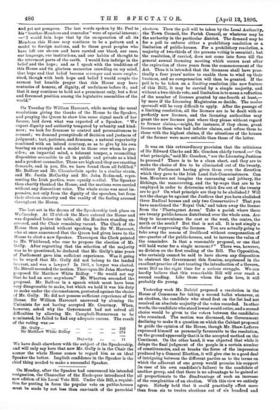On Monday, after the Speaker had announced his intended resignation,
the Chancellor of the Exchequer introduced the new edition of his Local Veto Bill. Under this Bill, a requisi- tion for putting in force the popular veto on public-houses must be made by not less than one-tenth of the parochial electors. Then the poll will be taken by the Local Authority, the Town Council, the Parish Council, or whatever may be the authority in the particular district. The demand may be for a poll to enforce either a prohibitory resolution or a limitation of public-houses. For a prohibitory resolution, a majority of two-thirds of the persons voting is essential ; but the resolution, if carried, does not come into force till the general annual licensing meeting which occurs next after the expiration of three years from the commencement of the Act. Thus it is intended that the licensees shall have prac- tically a four years' notice to enable them to wind up their business, and no compensation will then be granted. If the poll is to be taken on a limiting resolution (the new feature of this Bill), it may be carried by a simple majoriV, and without a two-thirds vote, and limitation is to mean a reduction of the number of licenses granted by one-fourth at least,— by more if the Licensing Magistrates so decide. The modus operandi will be very difficult to apply. After the passage of a limiting resolution, all the licenses are to be dealt with as perfectly new licenses, and the licensing authorities may grant the new licenses just where they please without regard to former claims,—might, for instance, if they chose, grant licenses to those who had inferior claims, and refuse them to those with the highest claims, if the situations of the houses of the former were more suitable than those of the latter.


































 Previous page
Previous page